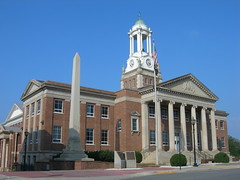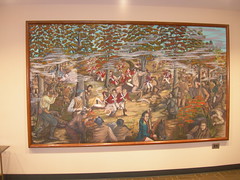 Image via Wikipedia
Image via WikipediaSome References to Robert Adams which I have found during my research:
Calendar of Virginia State Papers Volume VII page 147 May 19, 1794 John Clark to the Governor
Quary: whether or not is the act of 1787, Intitled "an act for the more speedy recovery of the debts due the Commonwealth," appointing the mode for the Sheriffs selling of lands, in force and to be attended to, as well as the one appointing the agents.
About the 7th of April I received by Mr. Richardson the following papers, to-wit: A sup'a vs. the Clerk of Campbell, for a Default in his officer; Two Ex'ons vs. Wm. Ward, Ex'or of Rob. Adams Sh'ff Campbell, for the Revenue of 1786 and 1787.
*If you will notice Robert Adams died in 1790 and they have William Ward as his executor. They apparently had to sell some of his property due to debts due to the Commonwealth.
Henings Volume XI page 250 May 7, 1783
I. Whereas extending the navigation of the river Roanoke from the falls, upwards to the fork of Staunton and Dan Rivers, and up the said rivers Staunton and Dan to the head thereof, will be of great benefit and advantage, as well to the inhabitants of the interior part of this state as to the public in general, and it is represented to this present general assembly that many persons are willing and desirous to subscribe and contribute thereto, for the encouragement thereof: For such laudable and useful undertaking,
II. Be it enacted by the present General Assembly, That Patrick Henry, Paul Carrington, Joel Watkins, Isaac Coles, Samuel Goode, Robert Wooding, James Callaway, Charles Lynch, Henry Walker, Robert Adams, John Wilson, Peter Perkins, William Harrison, John Marr and Edward Moseley, gentlemen, be, and they are hereby nominated, constituted, and appointed, trustees, for clearing so much of the said rives as shall be within this state; and they are hereby respectively authorized and empowered to take and receive subscriptions for that purpose; and if any person or persons shall neglect, fail, or refuse to pay the several sums of money respectively subscribed, for the purpose of this act, it shall and may be lawful for the said trustees respectively, or undertaker, to sue for and recover the same, in the name of the trustees, or undertaker for clearing the rivers, whereof they are by this act respectively appointed trustees; by petition where the subscription shall not exceed five pounds, and where the same shall be above that sum, by action of debt.
(Note III, IV, V, VI describes their duties and replacement in case of death, etc.)
I have been reading articles and books which tell the story of 1780. I have taken the below narrative from the following articles.
The Many Faces of Judge Lynch: Extralegal Violence and Punishment in America by Christopher Waldrep
Current Opinion Volume 31 page 768
The Green Bag -The Origin and History of Lynch Law by Howell Colston Featherston of the Lynchburg Virginia Bar
March 1900 Volume XII No. 3 page 155 and 156
Dr. T. W. Page's The Real Judge Lynch Atlantic Monthly Volume 88 page 731-743
On May 12, 1780, General Lincoln surrendered the town of Charles Town (now Charleston) to Lord Cornwallis and on May 29, American Soldiers under Colonel Buford were massacred at Waxhaw, NC. The Virginians are besieged by Indians, British, Tories, Thieves and the circumstances are grim.
At that time the whole of the mountainous section of Virginia was infested with Tories and desperadoes of the worst character, who burned and plundered the unprotected homes and property of the Continentals without mercy. Horse-stealing, too, owing to the fine prices paid by both armies for this class of property, had gained a marvelous popularity, and the unsettled condition of the time gave the thieves practical immunity from punishment. They were frequently caught red-handed in the act, but there was at that time but one court in the State for the final trial of felonies. The county courts were merely examining courts in all such cases. The trial court sat at Williamsburg, some two hundred miles from Campbell County, and the war rendered the transmission of prisoners thither, and the attendance of the necessary witnesses to convict them, next to impossible. The officers in charge of the prisoners would often be attacked by outlaws and forced to release their men, or be captured by British Troops and themselves made prisoners of war. The eficfacious operation of the civil laws was thus rendered out of question.
In 1780 the British determined to shift the war to the South and to roll up the American line from Georgia to the River Dan, and then to co-operate with General Philips and Benedict Arnold who were sent to Norfolk, in subjugating Virginia.
Now the Bedford Tories believed that the time had come when they might do something for their cause. They therefore entered into a conspiracy to upset the county organization and to seize for the use of Cornwallis on his arrival the stores that Lynch had collected for Green's army in North Carolina. Tradition says that Colonel Lynch was made aware of the conspirator's plans by one of their own number. Colonel Lynch, therefore, in conjunction with his neighbors, Capt. William Preston, Capt. Robert Adams, jr., Lynch's brother in law and also his nephew, and Col James Calloway, decided to take steps to frustrate the objects of the conspirators, and, in fact, to punish lawlessness of every kind, and restore, as far as posible, quiet to their harrassed community. No one knew better than they the risks they were assuming, yet they made no attempt at secrecy. They organized a company for the purpose of effectiving their objects, and, whenever practicable, called in to their aid such military volunteers as were accessible.
Under his direction, suspected persons were arrested and brought to his house, where they were tried by a court composed of himself, and associate judges Preston, Adams and Calloway. The accused was brought face to face with his accusers, heard the testimony against him, and was allowed to defend himself, to call witnesses in his behalf, and to show mitigating or extenuating circumstances. If acquitted, he was allowed to go, "often with apologies and reparation." If convicted, he was sentenced to receive thirty-nine lashes on the bare back, and if he did not then shout "Liberty Forever" to be hanged up by the thumbs until he gave vociferous utterance to that patriotic sentiment. The death penalty was never imposed. When the accused was found guilty, he was tied to a large walnut tree standing in Mr. Lynch's yard, and the stripes inflicted without delay. It is said that they were laid on with such vigor that as a rule even the stoutest hearted Tory willingly, and even eagerly, yelled for "Liberty". He had all the conspirators arrested and found among them some of the leading men of the county; two of them, indeed, Robert Cowan and Thomas Watts, had formerly been his fellow justices on the bench of the county court. This was a very serious situation. Lynch was himself on the point of setting out with his regiment to oppose the British. To leave these domestic foes at large was to invite disaster; to be hampered with them as prisoners on the rapid march he was forced to make was out of the question.
What was to be done with them? It appears that both custom and sentiment were violently opposed to visiting capital punishment upon the detected Tory conspirators. But fines and warning would evidently be indequate for they had already be imposed to little purpose for numerous minor offenses in aiding the enemy. So he leveled a fine of 20,000 pounds and a year's imprisonment on some of the Tories.
So this may seem like what he had to do, it was not within the confines of the law, hence, the indemificaton noted in the Hemings Statutes that I reported this week on January 24th protecting Colonel Lynch, Robert Adams and James Calloway.
North Carolina, 1780-81: Being A History Of The Invasion Of The Carolinas By The British Army Under Lord Cornwallis In 1780-81 (1889)
Forced Founders: Indians, Debtors, Slaves, and the Making of the American Revolution in Virginia
(Omohundro Institute of Early American History and Culture)
Revolution in Virginia, with a new Foreword
Give Me Liberty - The Struggle for Self-Government in Virginia








































